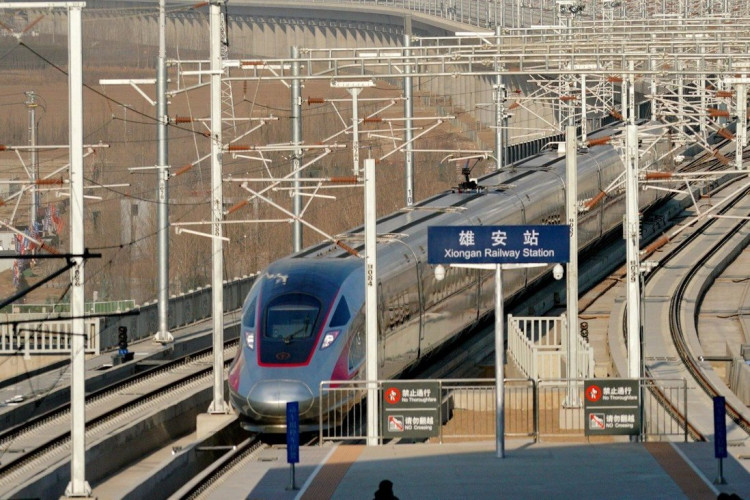A 57.24 billion yuan ($8.82 billion) high-speed railway project approved this week is an integral part of building Xiong'an Smart City.
China decided in 2017 to create the Xiong'an New Area - saying it will be a "strategically important project for the coordinated development of the Beijing-Tianjin-Hebei region."
Xiong'an in Hebei Province will, in effect, become an extension of Beijing and home to many government departments.
With a planned area of 1,770 square kilometers, Xiong'an will be an area of national significance - similar to the Shenzhen Special Economic Zone and the Shanghai Pudong New Area, Xinhua News Agency said.
Xiong'an will by 2035 be developed into a high-level modern city that is green, intelligent and livable, with relatively strong competitiveness and harmonious human-environment interaction, the official state news organization said.
Work began in 2019 and more than 100,000 workers are currently building about 300 sites there, it added.
The 342-kilometer railway with 12 stations connecting Hebei province's Xiong'an New Area with cities in Hebei and Shanxi provinces will take four-and-a-half years to complete.
Finance Ministry-controlled China State Railway Group Co. Ltd. said the country's railways will be extended by about 3,700 kilometers this year following on from an additional 4,933 kilometers laid last year.
China already has the world's largest high-speed rail network. The group intends to increase the high-speed network from 36,000 kilometers to 70,000 kilometers by 2035 and all rail tracks from 141,400 kilometers to 200,000 kilometers.
Analysts said extending railways will encourage the migration of rural workers to wealthier provinces and regions.
However, while promoting development the government has called for debt control. China's railway debt rose to 5.49 trillion yuan as of 2019 - or 65% of the value of its assets, according to a report by the South China Morning Post.
China saw its annual railway spending decrease to 781.9 billion yuan last year. It was the first time it fell below 800 billion yuan a year since 2013, according to a group annual report.
It is aiming for 1.177 trillion yuan in revenue this year compared with 1.13 trillion yuan in 2020.
In a related development, China rolled out a new high-speed bullet train designed for extremely cold climates - as low as minus 40 C.
"If a train stops in Harbin for an hour, because of the extremely cold weather the braking system can easily freeze," China State Railway Group's bullet train center director Zhou Song told the China Daily. "The new system will allow the brakes to move from time to time even if the train stops - like a person who stamps his feet to keep warm in cold weather."
Made with chromium-molybdenum alloy, a material that can endure low temperatures, it will connect Beijing with cities in the northeast - including Harbin, one of China's coldest cities.





